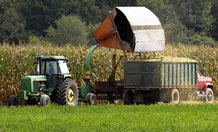articles

Farming the land
Is big better in farming?
Are small family farms essential to the character of Britain? This was one of the questions posed at a recent meeting of the Family Farmers Association (FFA), held at Westminster.
According to the FFA, in the past governments have geared regulatory systems towards larger farms and not recognised the valuable contribution to national well-being of the small farmer.
The Westminster debate brought together Lords, MPs and representatives from organisations such as the Royal Society for the Protection of Birds, Royal Institute of Chartered Surveyors, and the British Independent Fruit Growers Association. The University of Exeter’s Centre for Rural Policy Research Co-Director, Dr Matt Lobley, was one of the key speakers.
Dr Lobley’s research has focused on small family farms from the start of his career: his PhD thesis focused on small scale farming and the environment. His thesis remains the only systematic analysis of the contribution of small family farms to the management of the British countryside.
Dr Lobley said, “The long predicted demise of the family farm had proved to be exaggerated. Instead, small family farms have shown tenacity, persistence and adaptation in order to survive.”
A recent survey of farming in south west England, conducted by the Centre for Rural Policy Research, found that 81 per cent of farmers were at least second generation.
Dr Lobley added, “Our research also showed that it is more likely for smaller farms to be active and important in local communities. Their value cannot be defined only in terms of production and economic profitability. The smaller farmers have a more detailed knowledge of their environment and respond more diversely as the times and seasons require.”
Care of the environment and wild species requires sophisticated care and observation, according to the findings.
Christine Tacon, Managing Director of The Co-operative Farms, the other key speaker, presented an alternative view, sharing her experience of larger farms. The Co-operative Farms work with 200 farmers of different sizes, each with their own manager, some owned and some rented, covering over 50,000 acres from Aberdeen to Kent.
Ms Tacon said, “Advantages are that decisions can be taken centrally as necessary; they can deal directly with manufacturers, making upgrading machinery easy, and can get easier access to capital.”
She added that there were large gains from farming at this scale but that this form of organisation would not suit all farming, for example, dairy and livestock units.
Her view was that family farmers are better for livestock and for niche markets such as asparagus, serving local markets and restaurants. She appreciated the social contribution of the family farmer but felt there was no significant difference when it came to observing and caring for the environment.
There was no conclusion to the debate beyond that both small and large farms had their place. Each made particular contributions of value to the country. The event was chaired by Sir Colin Spedding CBE and sponsored by Andrew George MP.
Date: 8 June 2011
